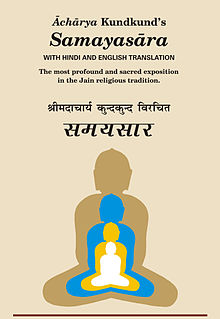| Samayasāra | |
|---|---|
 | |
| Information | |
| Religion | Jainism |
| Author | Kundakunda |
| Language | Prakrit |
| Period | 1st century B.C. |
| Verses | 439 |
| Part of a series on |
| Jainism |
|---|
 |
| Philosophy |
EthicsEthics of Jainism
|
| Jain prayers |
| Major figures |
| Major sectsSchools and Branches |
| Jain literature |
| Festivals |
| PilgrimagesTirth |
| Other |
Samayasāra (The Nature of the Self) is a famous Jain text composed by Acharya Kundakunda in 439 verses. Its ten chapters discuss the nature of Jīva (pure self/soul), its attachment to Karma and Moksha (liberation). Samayasāra expounds the Jain concepts like Karma, Asrava (influx of karmas), Bandha (Bondage), Samvara (stoppage), Nirjara (shedding) and Moksha (complete annihilation of karmas).
A modern English translation was published by Vijay K. Jain in 2022.
History
Samayasara was written by Acharya Kundakunda in Prakrit.
Contents
The original Samayasara of Kundakunda consists of 415 verses and was written in Prakrit. The first verse (aphorism) of the Samayasāra is an invocation:
O bhavyas (potential aspirants to liberation)! Making obeisance to all the Siddhas, established in the fifth state of existence that is eternal, immutable, and incomparable (perfection par excellence), I will articulate this Samayaprābhrita, which has been propounded by the all-knowing Masters of Scripture.
According to Samayasāra, the real self is only that soul which has achieved ratnatraya i.e. Samyak Darshan, Samyak Gyan and Samyak Charitra. These state when soul achieves purity is Arihant and Siddha. It can be achieved by victory over five senses. According to Samayasāra:
The Self, by his own enterprise, protecting himself from virtuous as well as wicked activities that cause merit and demerit, and stationing himself in right faith and knowledge, detached from body and desires etc., devoid of external and internal attachments, contemplates on the Self, through his own Self, and does not reflect upon the karmas and the quasi-karmic matter (nokarma); the Self with such distinctive qualities experiences oneness with the Self. Such a Self, contemplating on the Self, becomes of the nature of right faith and knowledge, and being immersed in the Self, attains, in a short span of time, status of the Pure Self that is free from all karmas.
— Samayasāra (187-189)
Commentaries
It has a number of commentaries on it. Atmakhyati or Samayasara Kalasha, written by Acharya Amritchandra in 12th century CE, is a 278-verse Sanskrit commentary. Samaysar Kalash Tika or Balbodh was written by Pande Rajmall or Raymall in 16th century CE. It is a commentary of Amritchandra's Samaysar Kalasha. Nataka Samayasara is a commentary on Rajmall's version which was written by Banarasidas in Braj Bhasha in 17th century CE.
See also
References
Citations
- Jaini 1991, p. 33.
- Jain 2022.
- ^ Orsini & Schofield 1981, p. 73.
- Jain 2012, p. 1.
- Jain 2012, p. 3.
- Jain 2012, p. 91.
- Orsini & Schofield 1981, p. 88.
- Orsini & Schofield 1981, p. 74.
Sources
- Jain, Vijay K. (2012), Acharya Kundkund's Samayasara (in Hindi and English), Vikalp Printers, ISBN 978-81-903639-3-8
- Jain, Vijay K. (2022). Ācārya Kundakunda's Samayasāra – with Hindi and English Translation आचार्य कुन्दकुन्द विरचित समयसार. Dehradun: Vikalp Printers. ISBN 978-93-5680-382-4.
- Chakravarti, Prof. A. (2008), Acharya Kundkund's Samayasara, Bhartiya Jnanpith, ISBN 978-81-263-1557-4
- Johnson, W. J. (1995), Harmless Souls: Karmic Bondage and Religious Change in Early Jainism with Special Reference to Umāsvāti and Kundakunda, Motilal Banarsidass, ISBN 81-208-1309-X
- Jaini, Padmanabh S. (1991), Gender and Salvation: Jaina Debates on the Spiritual Liberation of Women, University of California Press, ISBN 0-520-06820-3
- Kundakunda, Acharya (1950), Samayasara or the Nature of the Self, Bharatiya Jnanapitha
- Orsini, Francesca; Schofield, Katherine Butler, eds. (1981), Tellings and Texts: Music, Literature and Performance in North India, Open Book Publishers, ISBN 978-1-78374-105-2
- Kundakunda. Samayasāra, text, trans. and comm. by A. Chakravarti, Banaras, 1930.
| Jain literature | ||||||||||||||||
|---|---|---|---|---|---|---|---|---|---|---|---|---|---|---|---|---|
| Fourteen Purvas (The Prior Knowledge – considered totally lost) | ||||||||||||||||
| Śvetāmbara Canonical Texts |
|  | ||||||||||||||
| Digambara Texts |
| |||||||||||||||
| † Tattvartha Sutra is accepted by both Digambara and Śvetāmbara as their texts, although Śvetāmbaras do not include it under canonical texts. | ||||||||||||||||
| Gods | |||||
|---|---|---|---|---|---|
| Philosophy | |||||
| Branches |
| ||||
| Practices | |||||
| Literature | |||||
| Symbols | |||||
| Ascetics | |||||
| Scholars | |||||
| Community | |||||
| Jainism in |
| ||||
| Jainism and | |||||
| Dynasties and empires | |||||
| Related | |||||
| Lists | |||||
| Navboxes | |||||
This article related to a book about Jainism is a stub. You can help Misplaced Pages by expanding it. |